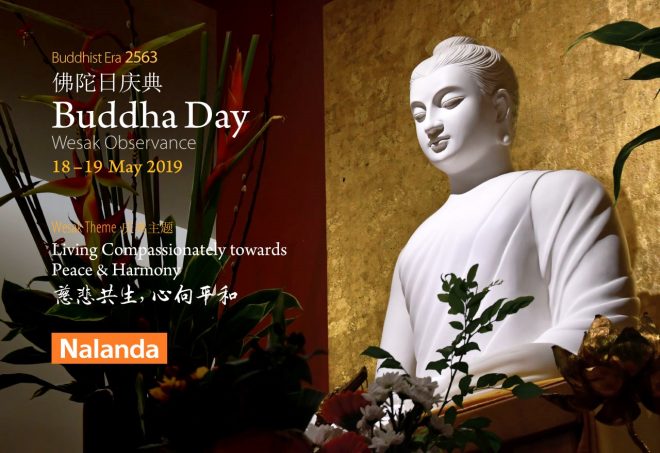‘Buddha Day’ Message B.E.2563
“Living Compassionately towards Peace and Harmony”
The Full-moon day of Vesakhā month on 19 May is known as ‘Buddha Day’, and marks the beginning of Year 2563 of the Buddhist Era. For Buddhists, ‘Buddha Day’ is not meant to be celebrated with merry-making. This auspicious day is observed most meaningfully when Buddhists use the occasion to purify our minds, to reflect on the meaning and purpose of life, and to find out how we can achieve true happiness in our daily lives with the practice of Dhamma.
Most people in the world are constantly searching for things that bring themselves ‘happiness’. Whether they are rich or poor, powerful or weak, young or old, their quest is never-ending – should happiness be searched externally. For example, some people try to find ‘happiness’ by going on holidays, travelling far distances to enjoy food, shopping, and many other activities to feed their desires. As soon as some of their desires are fulfilled, many other cravings arose in their minds which prompt fresh search for the ever elusive ‘happiness’.
Many people often rely on how others’ behave or how they are treated to define happiness. They are typically concerned about how others receive or judge them. Thus they often experience anxiety, jealousy, disappointment, anger, and a host of mental suffering, especially when they don’t get what they desire. Worse than this, there are also people who believe their own happiness is achieved through trampling on the rights of others; and so they inflict pain and suffering on large segments of humanity. Sadly, we hear of these unfortunate incidents almost every day in the news. Where has humanity gone wrong?
We can trace the suffering of humanity to its root cause — Ignorance. It is our ignorance of the true nature of existence that creates ‘self-ishness’, the belief that we can gain happiness by focusing on our own needs and ignoring the needs of others. We fail to see that in this universe all of us are intricately connected with all other beings, in the same way that all the knots in a net are connected. If we shake one knot, then we disturb the whole net.
The Buddha teaches us that the only way to experience happiness is to destroy the ignorance that binds us to our ‘selfhood’, and to replace it with wisdom to recognise the inter-relatedness of all beings, and to develop compassion towards them. With wisdom we “see ourselves just as others”. We can also see that other beings cherish their own safety and happiness as much as we do. When we are able to see that, we develop the nature of kindness and compassion, which is the desire to promote the well-being of all those that share this universe.
We also gradually realise that our happiness does not rely on external factors but starts with the purification of our own minds – by the reduction and eventual eradication of greed, anger, and delusion. The defilements to which an ignorant mind had been shackled to are replaced by the light of contentment, benevolence, and compassion.
True compassion goes beyond the narrow boundaries of race and religion, and extends from the highest dignitaries in the land to the most unfortunate creatures. Compassion elevates an ordinary mortal into a ‘Bodhisatta’ – one who aspires to help sentient beings to be released from the shackles of Samsaric suffering.
Fortunately, even today there are thousands of human beings who have this compassion and are working selflessly for the benefit and well-being of others. Let us rejoice for them and also make a vow to join them in their noble efforts. When each of us commits to working for the welfare of all beings, we will experience joy and happiness for ourselves, and bring about much peace and harmony in the universe.
Let us therefore on this sacred ‘Buddha Day’ sincerely take the vow to develop wisdom and to fill our hearts with compassion. By gradual measures, may we eradicate suffering in all its forms, and attain that blissful final goal of Nibbāna!


